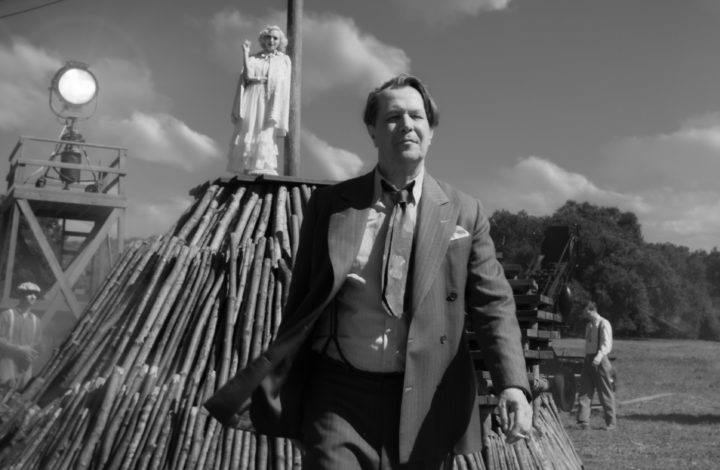
MPAA Rating: R | Rating: ★★½
Release year: 2020
Genre: Biography, Drama Director: David Fincher
I’m sad to report that Mank might be the least interesting thing David Fincher has ever directed. Where his feature length debut Alien3 has its decriers for its grungy aesthetic, irreverence for the previous installments, and quasi-nihilistic conclusion, at least the film was visually bold and narratively brash. Alien3 gave us a hint of what was to come with Fincher: grim or grisly films which are often about serial killers or sociopathic criminals, with a striking visual aesthetic and a procedural sense of directorial control. Fincher’s films are almost all about socially-isolated individuals, not because they necessarily want to be outsiders or lonely, but because they just don’t quite fit the mold and don’t play well with others. This latter trait is certainly present in Mank, a gimmicky quasi-biopic about misfit alcoholic screenwriter Herman J. Mankiewicz (Gary Oldman) and his herculean efforts to write the script for Citizen Kane. But this is where the similarities end; Mank is absent of serial killers, dramatic opening title cards, or intense library research sequences. It’s also absent of much of anything to keep my attention.
Mank is based on a screenplay by Fincher’s late father, Jack Fincher, which the younger Fincher had intended to make in the 1990s. As such, the long-gestating personal project does feel like a kind of elegy to both fathers and the movies of the past, the classic dream factory era of Hollywood. The Finchers structure Mank in a parallel manner to Citizen Kane, telling Mank’s story through a series of flashbacks between “present” Mank writing his magnum opus while in convalescence in 1940, and the “past” Mank through a whirlwind tour of 1930s film studio culture. I’ve seen Mank described as a “love letter” to classic Hollywood, but I’m not sure “love” is an apt descriptor. This Hollywood is made up of deceivers and schemers who are all trying to make as much money as they can during the Depression era, and have political ambitions to boot. Indeed, much of Mank is devoted to the 1934 gubernatorial race in California between socialist Upton Sinclair (portrayed in a cameo by Bill Nye the Science Guy!) and Republican Frank Merriam. The eponymous screenwriter is portrayed as an acerbic-but-abrasive oaf, an alcoholic and gambler who can’t keep his mouth shut, especially when it comes to his left-leaning socialist politics. His wife, Sara (Tuppence Middleton, who gives a remarkable understated performance), puts up with him with little complaint; his fellow screenwriting brother, Joseph (Tom Pelphrey), has less patience for his antics, but supports him nonetheless. Mank’s acquaintances include starlet Marion Davies (Amanda Seyfried) and her media tycoon husband, William Randolph Hearst (Charles Dance), as well as studio executives Louis B. Mayer (Arliss Howard) and Irving Thalberg (Ferdinand Kingsley). Each of these characters serve as inspirations for Citizen Kane, as does Mank’s secretary and scribe, Rita Alexander (Lily Collins).
I’ve been trying to put my finger what makes Kane so interesting after all these years—it’s deservedly considered a masterpiece—and Mank so dull and forgettable. Both focus on unlikeable central figures; both serve up sentiment and melodrama in spades; both feature a complex narrative structure which jumps around in time; both are made by highly-controlled auteurs with singular visions for their work. And yet, while Kane keeps me riveted, I found myself checking my watch repeatedly throughout Mank, and I have little desire to attempt a revisit. But why? The supporting performances are generally solid, with the standouts being Seyfried, Collins, and Middleton. The jazzy score by frequent Fincher collaborators Trent Reznor and Atticus Ross is generally appealing and apropos, and the script contains both humor and political critique, i.e., it’s both meant to entertain and offer something to say. The two stand-out faults I can discern are (1) the casting of Oldman as Mank and his subsequent outlandish performance, and (2) the assumption that audiences will be interested in “inside baseball” Hollywood politics. First, Oldman: he’s too old. When Mank tells Orson Welles (a perfectly-cast Tom Burke) that he’s age “43,” I honestly couldn’t stop laughing. Having the 62-year-old Oldman play literally half his age (he’s supposed to be about age 32 in the screen shot above) disrupts any suspension of disbelief. As Mank observes, the movies can make audiences believe King Kong is 100 feet tall and the 40-year-old Mary Pickford is a virgin; but Mank itself couldn’t make me believe Gary Oldman was Mank.
Second: Hollywood politics. A significant amount of the narrative runtime in Mank is devoted to MGM and Hearst trying to influence the 1934 election for the Republicans, even resorting to a form of “fake news” to manipulate California constituents. There’s a lot of dense talk—emphasis on talk— about the difference between Communism and socialism, the financial dynamics of the studio system, the writer’s guild forming, the various contracts—both social and legal—which folks in filmmaking have to navigate, etc. This melodramatic history lesson comes across as such; it’s less a revelation of what this era was like and more an attempt to teach us about it through mimicry, right down to Fincher’s formal choices of black-and-white images (albeit entirely in digital, which gives everything an artificial sheen) and the inclusion of fake “cigarette burns” in the top right corner. There is a subtle difference between imitation and re-creation, and Mank is unfortunately more the former than the latter. Still, like its central character, for all its flaws Mank still has moments of grace, levity, and insight, giving us a behind-the-scenes look at a Hollywood myth.
IMDB Listing: https://www.imdb.com/title/tt10618286/